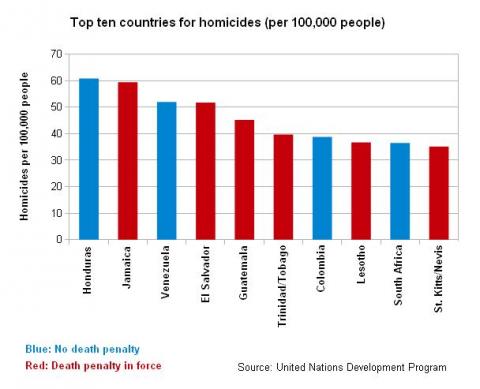Do countries with the death penalty have higher homicide rates?
Since the Government launched its new 'e-petitions' site this week there has been a surge in debate surrounding the death penalty — one of the most popular topic areas in the site's first few days.
Newspapers, bloggers and other commentators quickly joined the debate with both sides of the argument quoting different statistics at each other in attempts to gain the upper hand.
One of the most contentious debates surrounds the deterrent effect of the death penalty. The anti-capital punishment campaigning group 'Reprieve', for instance, quote figures which suggest that countries with the death penalty tend to have higher homicide rates. They claimed last year:
"The five countries in the world with the highest homicide rates that do not impose the death penalty have nearly half the number of murders per 100 000 people than the five countries with the highest homicides rates which do impose the death penalty (United Nations Development program)"
The validity of using static murder rates as a means of determining the penalty's deterrent effect is of course open to question.
While the figures could lead one to conclude that capital punishment is ineffective given the high murder rates in countries where it is legal, it could also be the case that the countries which do practice it would have much higher homicide rates if the death penalty were not in place.
Homicide rates have, however, proven to be a common measure of deterrence in the United States, and have also been the basis of detailed research on the matter.
In light of this, Full Fact decided to test the claim that countries with the death penalty tend to have higher homicide rates on average, using the latest United Nations data.

The five countries with the highest homicide rates who also have legal capital punishment are Jamaica, El Salvador*, Guatemala, Trinidad & Tobago and Lesotho, with an average between them of 46.6 homicides per 100,000 people.
Meanwhile the five such countries who have abolished the death penalty for all crimes are Honduras, Venezuela, Colombia, South Africa and Ecuador, with average homicides of 41.3 per 100,000 people.
This, however, is far more than half the number of murders amongst the five countries with the penalty still in force.
Taking average homicide rates of all countries with and without the death penalty, the difference is marginally greater, with 36.7 homicides per 100,000 amongst those with the penalty compared to 27.4 amongst those which abolished it.
Finally, Full Fact calculated if there was any correlation between countries imposing a death penalty and having higher homicide rates, as the averages would suggest.
Ranking all 147 countries for which data was available in terms of homicide rate, and comparing this to whether the penalty existed or not, yielded a weak positive correlation of 0.2.**
This means that there is some correlation between imposing the death penalty and having higher homicide rates, but this correlation is in fact weak to bordering on insignificance.
So it seems that those using global homicide rates to support either side of the death penalty debate need to justify why their findings are statistically significant. Our calculations suggest there isn't enough proof that capital punishment is or isn't an effective deterrent to murder.
--------------------
*El Salvador impose the penalty only in exceptional cases.
**Correlation derived using Spearman's Rank Correlation Coefficient using binary ranking for death penalty imposition by country.